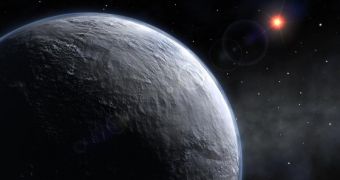Finding a planet beyond our solar system is pretty difficult, because they don't give off light and are eclipsed by the stars around which they orbit. Then how can astronomers find out if such a planet has atmosphere and what is this made of?
For example, recently, the whole scientific community was ecstatic because of the discovery of the most Earth-like planet ever spotted, then thought to have perfect conditions for water, an essential ingredient for life. Eventually, it was discovered that its atmosphere was too hot to allow the existence of liquid water.
The discovery was made using new computer models that can accurately predict planetary and extrasolar planet atmospheres. Bruce Fegley, Jr., Ph.D., professor of earth and planetary sciences in Arts & Sciences at Washington University in St. Louis, has worked on computer models that can provide hints to what comprises the atmosphere of such planets and better-known celestial bodies in our own solar system.
This new computer model provided compelling evidence of an increasing water content in going from Jupiter (depleted in water), to Saturn (less riched in water compared to other volatiles), to Uranus and Neptune, which have large water enrichments.
"The farther out you go in the solar system, the more water you find," said Bruce Fegley, Jr., Ph.D., professor of earth and planetary sciences in Arts & Sciences at Washington University in St. Louis. "The theory about the Gas Giant Planets (Jupiter, Saturn, Uranus, and Neptune) is that they have primary atmospheres, which means that their atmospheres were captured directly from the solar nebula during accretion of the planets."
Using this computer model, he and his team can speculate on the atmospheric composition of Earth-like planets in other solar systems. "With new theoretical models we are able to surmise the outgassing of materials that went in to forming the planets, and even make predictions about the atmospheres of extrasolar terrestrial planets," he said.
So, scientists searching for signs of life beyond Earth are keen on learning about the presence of water on other planets both in and beyond our solar system.

 14 DAY TRIAL //
14 DAY TRIAL //